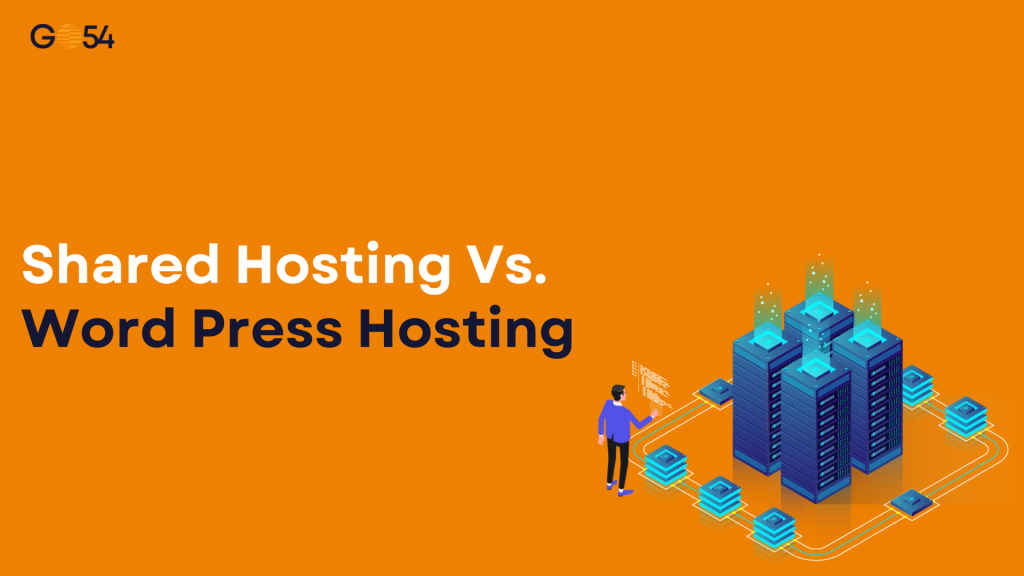Choosing the right hosting plan can be the difference between a smooth online journey and constant headaches. Many small business owners, freelancers, and developers often debate: shared hosting vs WordPress hosting — which one is better?
The truth is, these hosting types serve different needs. Picking the wrong one could affect your website’s speed, security, scalability, and even your budget. In this guide, we’ll break down the difference between shared hosting and WordPress hosting in clear terms, so you can make the best choice for your project.
What Is Shared Hosting?
Shared hosting is like living in an apartment complex where everyone uses the same water, electricity, and parking space. In hosting terms, that means you share CPU power, memory, and bandwidth with other websites on the same server. This setup makes it one of the most common types of hosting because it’s cost-effective, simple to manage, and beginner friendly.
Your website is placed on a single server alongside many others, and while this keeps expenses low, it also means your site’s performance can be affected by the activity of neighboring sites, much like how a crowded apartment elevator can slow down your trip.
Advantages of Shared Hosting:
- Low cost – Ideal for startups and personal projects.
- Easy to set up – No technical skills needed.
- All-in-one solution – Comes with email, control panel, and basic security.
Cons of Shared Hosting:
- Limited control – Customization is restricted.
- Resource sharing – Traffic spikes on other sites can slow yours.
- Scalability challenges – Not ideal for high-growth websites
What Is WordPress Hosting?
WordPress hosting is specifically optimized for the WordPress content management system (CMS). This means the server configuration, caching, and support are tailored for WordPress websites.
You’ll typically see two types:
- Managed WordPress Hosting – The provider handles updates, backups, and performance optimization.
- Unmanaged WordPress Hosting – More control for developers but requires technical know-how.
WordPress Hosting Pros and Cons
Pros:
- One-click WordPress installs.
- Automatic updates and backups.
- WordPress-specific security and support.
Cons:
- May cost more than shared hosting.
- Best for WordPress sites only (not multipurpose).
- Plugin dependency risks – Since WordPress relies heavily on plugins, poorly coded or outdated ones can create security vulnerabilities or slow down your site, even on optimized hosting.
Key Differences Between Shared and WordPress Hosting
Here’s a quick web hosting comparison so you can see the difference between shared and WordPress hosting at a glance:
| Feature | Shared Hosting Plan | WordPress Hosting Provider |
|---|---|---|
| Speed | Moderate, depends on shared resources | Optimized for WordPress, faster load times |
| Ease of Use | Beginner-friendly cPanel | Tailored WordPress dashboard |
| Support | General hosting support | WordPress-specific support |
| Price | Lowest cost option | Slightly higher, but with extra WP features |
| Flexibility | Suitable for multiple CMSs | Best for WordPress only |
| Scalability | Limited resources | Better scalability options for WP sites |
Which One Should You Choose? Use Cases and Scenarios
Choosing between shared hosting vs WordPress hosting depends on your goals, technical skills, and budget.
Scenario 1: Personal Blog or Portfolio
If you’re starting a personal blog, online CV, or creative portfolio and don’t expect huge traffic volumes, shared hosting offers the perfect balance of affordability and simplicity. It comes with easy setup tools and basic security, allowing you to focus on creating content rather than managing complex server settings.
Scenario 2: WooCommerce Store or Business Site on WordPress
E-commerce websites, especially those running on WooCommerce, benefit from the speed, uptime, and security that WordPress hosting delivers. The automatic updates, specialized support, and built-in caching features ensure smoother transactions and fewer technical hiccups during peak sales periods.
Scenario 3: Freelancers Handling Client Projects
If most of your clients use WordPress, then managed WordPress hosting is a no-brainer for its efficiency and WP-specific tools. However, if your client projects span multiple platforms (Joomla, Drupal, custom HTML), a shared hosting plan offers more flexibility. You can host different CMS installations in one place without paying for separate accounts.
Scenario 4: Growing Small Business
Small businesses launching their first website can start with shared hosting to keep costs low, then upgrade to WordPress hosting or cloud hosting as traffic grows. This approach allows you to test your online presence before investing in higher-performance plans.
Scenario 5: Content-Heavy News or Media Site
If you’re running a news platform, magazine, or media-heavy blog, site speed is critical. WordPress hosting, especially managed plans, provide optimized performance for frequent content updates, high-resolution images, and embedded videos.
Scenario 6: Hobby Project or Testing Environment
For side projects, testing new web ideas, or running a sandbox environment for development, shared hosting is the economical choice. It gives you the tools you need without committing to higher monthly fees.
Scenario 7: Membership or Subscription-Based Websites
Sites with gated content, online courses, or subscription models need robust performance and security. WordPress hosting offers specialized configurations to handle user logins, membership plugins, and payment processing more efficiently.
What About Cloud Hosting and SSD Hosting?
You may have heard of cloud hosting vs web hosting or SSD-based plans.
Cloud hosting uses multiple servers to host your site, offering high reliability and scalability. It can power both shared and WordPress hosting environments. SSD hosting simply means the provider uses faster solid-state drives for storage, which improves performance for either hosting type.
In short, cloud vs shared hosting is about infrastructure, not CMS optimization. You could have shared web hosting vs cloud hosting scenarios depending on your provider.
Conclusion: Match Your Hosting to Your Goals
When comparing shared hosting vs managed WordPress hosting, it’s not about which is “best” overall, it’s about which is best for you.
If you’re on a tight budget, want to run multiple types of sites, or are just starting out, choose Shared Hosting for its affordability, simplicity, and versatility.
If you run a WordPress-based business site, online store, or blog where speed, security, and WordPress-specific support matter, go for WordPress Hosting to get an optimized, hassle-free experience.
Whatever you choose, make sure your provider offers scalability so you can grow without switching hosts frequently. At GO54, you can start small, expand seamlessly, and get all the tools you need to succeed online.
Ready to launch your site? Pair your hosting with a memorable domain name and get started today.




